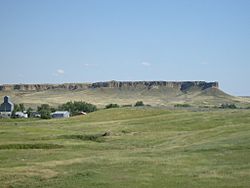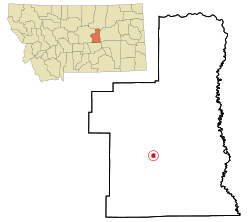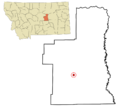Winnett, Montana facts for kids
Quick facts for kids
Winnett, Montana
|
|
|---|---|

Rimrocks just south of Winnett, MT
|
|

Location of Winnett, Montana
|
|
| Country | United States |
| State | Montana |
| County | Petroleum |
| Named for | Walter J. Winnett |
| Area | |
| • Total | 1.02 sq mi (2.64 km2) |
| • Land | 1.02 sq mi (2.64 km2) |
| • Water | 0.00 sq mi (0.00 km2) |
| Elevation | 2,943 ft (897 m) |
| Population
(2020)
|
|
| • Total | 188 |
| • Density | 184.68/sq mi (71.28/km2) |
| Time zone | UTC-7 (Mountain (MST)) |
| • Summer (DST) | UTC-6 (MDT) |
| ZIP codes |
59084, 59087
|
| Area code(s) | 406 |
| FIPS code | 30-81100 |
| GNIS feature ID | 2413500 |
Winnett is a small town in Montana, United States. It is the main town and county seat for Petroleum County. In 2020, about 188 people lived there.
Winnett offers many services for its residents and visitors. You can find a general store, gas stations, and a post office. The town also has a school for students from kindergarten through 12th grade. There is a motel, RV parks, a campground, and a bar-and-grill for people visiting. A new event venue was finished in 2023.
Local news is shared in the Roundup Record Tribune & Winnett Times. This newspaper comes out once a week. The closest medical help is in Lewistown.
Contents
History of Winnett
Winnett is named after Walter John Winnett. He was born in Toronto, Canada, in 1860. As a boy, Walter ran away from home looking for adventure. He was very good at shooting, which helped him get jobs. He would hunt to provide fresh meat for groups of people.
Walter Winnett's Adventures
Walter was once captured by Sioux Native Americans. They later adopted him into their tribe. They gave him the name Eagle Eyes because of his amazing shooting skills.
In 1879, Walter Winnett started a ranch in Montana Territory. His large ranch house, built in 1900, was a central spot for the community. It hosted dances, weddings, funerals, church services, and even served as a school.
The Oil Boom Era
Billings was the nearest big town. So, Winnett started a business to haul supplies using horses and large wagons. In 1910, he built a store and asked for a post office.
In February 1920, oil was found near Cat Creek. This discovery caused Winnett's population to grow very quickly. It almost doubled in less than a year. The town grew from 1,213 people in 1922 to over 2,000 in 1923.
New buildings couldn't be built fast enough. Many people lived and worked in tents. This sudden growth led to new improvements in Winnett. The town got its first sidewalks, paved streets, and a water system.
After the Boom
After the big oil boom of the 1920s, Winnett's population and services slowly decreased. Another smaller oil boom happened in 1946. This was also due to oil being found again in Cat Creek.
The Milwaukee Railroad stopped running trains to Winnett in the early 1970s. You can still see the old grain elevator and parts of the land where the tracks used to be.
More recently, the Bakken oil boom has affected towns further east in Montana. However, it has not had the same impact on Winnett. There are still talks about finding oil in other areas near Winnett.
Geography and Climate
Winnett is located along Montana Highway 200. Another road, Highway 244, connects Winnett to Roundup. The town covers about 1.02 square miles (2.64 square kilometers) of land.
Two places in Winnett are listed on the National Register of Historic Places. These are the Winnett School and the Winnett Block.
What is Winnett's Climate Like?
Winnett has a semi-arid climate. This means it is generally dry, but not a desert. It gets some rain, but not a lot.
| Climate data for Winnett, 1991–2020 simulated normals (2949 ft elevation) | |||||||||||||
|---|---|---|---|---|---|---|---|---|---|---|---|---|---|
| Month | Jan | Feb | Mar | Apr | May | Jun | Jul | Aug | Sep | Oct | Nov | Dec | Year |
| Mean daily maximum °F (°C) | 34.5 (1.4) |
38.1 (3.4) |
48.2 (9.0) |
58.1 (14.5) |
67.5 (19.7) |
76.5 (24.7) |
87.1 (30.6) |
86.7 (30.4) |
75.6 (24.2) |
60.4 (15.8) |
46.6 (8.1) |
36.5 (2.5) |
59.7 (15.4) |
| Daily mean °F (°C) | 22.8 (−5.1) |
25.9 (−3.4) |
35.2 (1.8) |
44.8 (7.1) |
54.1 (12.3) |
63.0 (17.2) |
71.4 (21.9) |
70.2 (21.2) |
59.7 (15.4) |
46.8 (8.2) |
34.2 (1.2) |
24.8 (−4.0) |
46.1 (7.8) |
| Mean daily minimum °F (°C) | 11.1 (−11.6) |
13.8 (−10.1) |
22.3 (−5.4) |
31.3 (−0.4) |
40.8 (4.9) |
49.6 (9.8) |
55.6 (13.1) |
53.6 (12.0) |
43.9 (6.6) |
32.9 (0.5) |
21.7 (−5.7) |
13.3 (−10.4) |
32.5 (0.3) |
| Average precipitation inches (mm) | 0.45 (11.39) |
0.35 (8.80) |
0.57 (14.50) |
1.33 (33.76) |
2.66 (67.59) |
2.58 (65.41) |
1.47 (37.33) |
1.34 (33.92) |
1.03 (26.05) |
1.15 (29.16) |
0.45 (11.51) |
0.42 (10.76) |
13.8 (350.18) |
| Average dew point °F (°C) | 12.0 (−11.1) |
13.8 (−10.1) |
20.3 (−6.5) |
27.3 (−2.6) |
36.3 (2.4) |
45.3 (7.4) |
47.7 (8.7) |
44.4 (6.9) |
37.6 (3.1) |
29.7 (−1.3) |
20.3 (−6.5) |
13.5 (−10.3) |
29.0 (−1.7) |
| Source: PRISM Climate Group | |||||||||||||
Population Changes Over Time
| Historical population | |||
|---|---|---|---|
| Census | Pop. | %± | |
| 1920 | 316 | — | |
| 1930 | 408 | 29.1% | |
| 1940 | 399 | −2.2% | |
| 1950 | 407 | 2.0% | |
| 1960 | 360 | −11.5% | |
| 1970 | 271 | −24.7% | |
| 1980 | 207 | −23.6% | |
| 1990 | 188 | −9.2% | |
| 2000 | 185 | −1.6% | |
| 2010 | 182 | −1.6% | |
| 2020 | 188 | 3.3% | |
| U.S. Decennial Census | |||
Who Lives in Winnett? (2010 Census)
In 2010, there were 182 people living in Winnett. These people made up 91 households and 50 families. The town had 132 housing units. Almost everyone living in Winnett (100%) was White. About 1.1% of the population was Hispanic or Latino.
Out of the 91 households:
- 22.0% had children under 18 living with them.
- 47.3% were married couples living together.
- 6.6% had a female head of household with no husband.
- 1.1% had a male head of household with no wife.
- 45.1% were not families.
About 42.9% of all households were single individuals. Also, 19.8% of households had someone aged 65 or older living alone. The average household had 2 people, and the average family had 2.74 people.
The average age in Winnett was 50 years old.
- 18.7% of residents were under 18.
- 3.7% were between 18 and 24.
- 19.1% were between 25 and 44.
- 33.9% were between 45 and 64.
- 24.2% were 65 or older.
There were slightly more males (53.8%) than females (46.2%) in the town.
Education in Winnett
The Winnett Independent School District serves students from kindergarten through 12th grade. The school's sports teams are known as the Rams. In 2006, Winnett Schools received a special award. They were one of 200 schools nationwide to win the Blue Ribbon School award.
The Petroleum County Community Library serves the area. This local public library also offers a pre-school program once a week.
Images for kids
See also
 In Spanish: Winnett (Montana) para niños
In Spanish: Winnett (Montana) para niños



